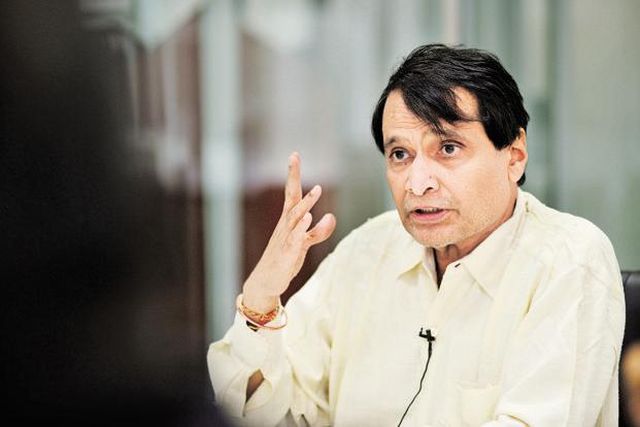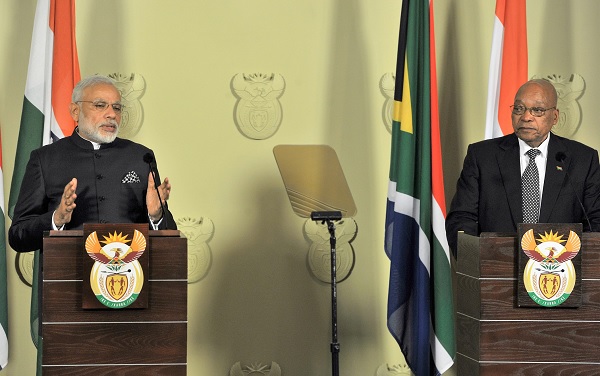
by admin | May 25, 2021 | Economy, Investing, News, Opinions
 By Taponeel Mukherjee,
By Taponeel Mukherjee,
The adage that “investing in the right industry is at least as important, if not more, than choosing the right investments” holds true in India as much as it does in any other country.
An investor needs to invest in industries that generate better returns relative to others and then needs to find specific assets within the industry that are available at attractive valuations. Regulatory conditions, demographic trends and inter-linkages between sectors are some of the drivers of growth and consequent investment attractiveness.
For instance, the recent decision on the localisation of data in India creates an investment opportunity for data centre infrastructure investors and ancillary industries. Assuming regulations are implemented and enforced credibly, tremendous infrastructure in data centres will be required to localise data.
The average monthly mobile data consumption per user in India increased by 15 times from the end of 2014 to the end of 2017 to over 4GB. The number is expected to more than triple in the next five years. Given this is mobile data consumption, if one were to add other sources of retail and industrial data consumption, one gets an idea of the vast data storage need in India.
The exponential data growth creates an opportunity for investors in sophisticated and large-scale data centres. Data centre investments will also imply opportunities in the supporting ecosystem of real estate and power supply. Real estate firms that can provide the vital data centre infrastructure become an attractive proposition as do power producers who can provide the high-power consumption needs of data centres.
The entire ecosystem benefits and creates investment opportunities for many investors. Identifying inter-linkages within industries is important for specialised investors. The impact that regulations can have in creating value across a chain of sectors is worth keeping in mind.
Changing consumption patterns and trends in income will be another significant driver of industry attractiveness. For an investor looking at sectors with long-term secular trends, watching how non-food consumption is changing with rising incomes should provide valuable insights. Discretionary consumer space is where a large part of the action should be expected given gradually rising incomes.
In the Boston Consulting Group report titled “The New Indian: The Many Facets of a Changing Consumer”, Abheek Singhi, Nimisha Jain and Kanika Sanghi point out a category that takes off for discretionary consumer products above a certain income level. This category includes industries such as entertainment, non-essential food consumption, high-end clothing and cosmetics. Capturing the upside in sectors that will benefit from rising incomes is crucial for investors looking to ride the India growth story.
Identifying attractive industries from an investment perspective is the first vital step. Industries with the correct growth dynamics help narrow down the list of outperformers across sectors. Institutional investors can approach the potential attractive investment opportunities within the identified areas through a variety of strategies, the key driver being the acquisition of the assets at attractive valuations.
Accessing opportunities through investments in the listed equity markets is one potential path if pockets of opportunities exist. Alternatively, investors with a long-term focus can create value through accessing assets through private markets, if they provide significantly lower valuation multiples due to both smaller size of businesses and current valuation multiples in the public equity markets.
Choice of the industry holds the key regardless of whether investors are focused on infrastructure businesses or consumer-facing sectors. While fundamental valuations are the absolute gospel for investing, favourable industries do provide a helpful “tailwind” for investors.
An analysis of annualised 10-year returns for S&P 500 sectors (represented by SPDR Exchange Traded Funds XLU & XLF as proxies) shows how utilities were able to deliver slightly higher annualised returns at 8.81 percent over financials (which faced significant regulatory hurdles over the last decade) at 7.34 percent.
The critical question investors must be asking of financials today is whether a less onerous regulatory regime is in the offing, thereby boosting returns over the next decade, or whether the new age fintech firms will create barriers to higher profits. The same rules apply in an Indian context. For patient investors looking at decade-long investment horizons, industry analysis can add significant value.
(Taponeel Mukherjee heads Development Tracks, an infrastructure advisory firm. Views expressed are personal. He can be contacted at taponeel.mukherjee@development-tracks.com or @Taponeel on Twitter)
—IANS

by admin | May 25, 2021 | Corporate, Corporate Governance

Commerce Minister Suresh Prabhu
Guwahati : Commerce and Industry Minister Suresh Prabhu said a new industrial policy is being framed after 25 years and it is “being designed” to equip Indian industry for the future.
The minister spoke at an event organised here to commence the “nation-wide consultations with industry” on the proposed new policy.
According to Prabhu, the policy is being designed in a way that it will adequately adress the future needs of industry and that prior attempts in 1956 and 1991 were driven by “ideology” or formulated at a time of financial crisis.
The minister stressed “the laser focus of the government” to make business easier for industry.
In this regard, he highlighted multiple initiatives of the government to reduce the burden of regulations on industry. He also talked about the importance of Centre-state cooperation and the need for change even at the district-level.
The consultation event was organised by Department of Industrial Policy and Promotion in partnership with Ficci.
The event was attended by more than 120 industrialists from the Northeast, in addition to government officials from the region, Ficci said in a statement.
—IANS

by admin | May 25, 2021 | Business Summit, Events, Halal Food, Halal Industries, Halal Medicine, Muslim World
 Istanbul : The Organisation of Islamic Cooperation (OIC) stated that the size of the global halal products market has grown exponentially in the last decade, from $3.7 trillion in 2012 and expected to reach $6.4 trillion by 2019.
Istanbul : The Organisation of Islamic Cooperation (OIC) stated that the size of the global halal products market has grown exponentially in the last decade, from $3.7 trillion in 2012 and expected to reach $6.4 trillion by 2019.
This was contained in the statement of OIC Secretary General Dr. Yousef Al-Othaimeen at the opening ceremony of the 5th edition of the OIC Halal Expo and the World Halal Summit held in Istanbul, Turkey, on November 23-25.
OIC Assistant Secretary General for Economic Affairs Ambassador Hameed Opeloyeru, who read out the statement of the secretary general, explained that organizing the annual halal expo is one of the main planks for advancing trade in the OIC. The event affords actors — traders, investors, exporters, the industry guilds and the general public — the opportunity to know the latest halal products in the member states, with a view to promoting halal products and increasing communication between the investors and industry leaders.
He stressed that there was a need for active bodies in the food, halal services, production and marketing sector in the OIC member states to follow a common course to ensure that all specialized bodies unify their standards and issue accreditation certificates for a suitable regulatory environment for these procedures.
Istanbul is hosting the Halal Expo in cooperation with the OIC-affiliated Islamic Centre for the Development of Trade (ICDT), Standards and Metrology Institute for Islamic Countries (SMIIC).
—IINA/SM/OIC-UNA

by admin | May 25, 2021 | Business Summit, Events, News

Prime Minister Narendra Modi and the President of the Republic of South Africa, Jacob Zuma, during the Joint Press Statement, at Union Buildings, in Pretoria, South Africa
Pretoria:(IANS) Prime Minister Narendra Modi on Friday laid emphasis on industry-to-industry ties between India and South Africa for greater economic gains while thanking South African President Jacob Zuma for extending support to India’s bid for membership in the Nuclear Suppliers Group.
“I am convinced that industry-to-industry ties not only can bring rich economic gains to our societies, they can give a new shape to our partnership, and drive it to new levels,” Modi said in a joint press statement with Zuma following delegation-level talks between the two sides.
“And, in the process, also help both our nations to play a more robust regional and global role,” he stated.
Modi said that in the last two decades, the relationship between the two countries has been a story of strong advances and concrete achievements.
“Two-way trade has grown by over 300 per cent in the last 10 years. Indian companies hold strong business interests in South Africa,” he said.
The Prime Minister said that one-fourth of India’s investments in Africa were in South Africa.
“And there is potential to expand our business and investment ties further, especially in the areas of mineral and mining, chemicals and pharmaceuticals, high technology manufacturing and information and communication technology,” he said.
Modi said that given the nature of the two countries’ developing economies, both should also focus on improving human capital.
The Prime Minister said the two countries could also partner in the field of defence and security.
“Both, at the level of industry and for our strategic and security needs. In India, this is one of the sectors witnessing a complete transformation,” he said.
Modi said, during Friday’s talks he and Zuma agreed on the need to work more closely on international issues and emerging global challenges.
“I thanked the President for South Africa’s support to India’s membership of the Nuclear Suppliers Group,” he said.
“We know that we can count on the active support of our friends, like South Africa,” he stated, adding that climate change was another issue of shared concern.
He said that both sides agreed to “cooperate actively to combat terrorism, both in our region and in the world”.
He welcomed South Africa’s chairmanship of the Indian Ocean Rim Association and said that it has emerged as a key platform of engagement for the maritime neighbours connected by the Indian Ocean.
On a personal note, Modi said the visit has given him the opportunity to pay homage to the two great souls, Mahatma Gandhi and Nelson Mandela.
In his remarks, President Zuma said that over 100 Indian companies were operating in South Africa and these were playing a “significant role” in the country’s economy and job creation.
“We are looking to diversify South Africa’s exports to India,” he said.
Zuma cited the defence sector, deep mining and renewable energy as areas of bilateral cooperation.
According to him, water management, pharmaceuticals and infrastructure development are areas that hold potential in the future.
The President also called tourism promotion for improving people-to-people ties.
Following Friday’s talks, both sides signed three memorandums of understanding – on information and communication technology, tourism, and grass root innovation in the science and technology – and a programme of cooperation in arts and culture.
After a lunch hosted by Zuma, South African Deputy President Cyril Ramaphosa called on the visiting dignitary.
Modi and Zuma are scheduled to attend an India-South Africa business summit later on Friday.
The Prime Minister will then visit the Constitution Hill and the Nelson Mandela Foundation in Johannesburg.
In the evening, he will address an Indian diaspora rally in Johannesburg before departing for Durban where his engagements are scheduled for Saturday.
Modi arrived in South Africa from Mozambique on Thursday night on the second leg of his four-nation tour of Africa.
This is his first visit to mainland Africa and is also the first prime ministerial visit from India to South Africa since the then Prime Minister Manmohan Singh arrived in 2013 for the G20 summit in Durban.
Apart from Mozambique and South Africa, Modi will also visit Tanzania and Kenya.




